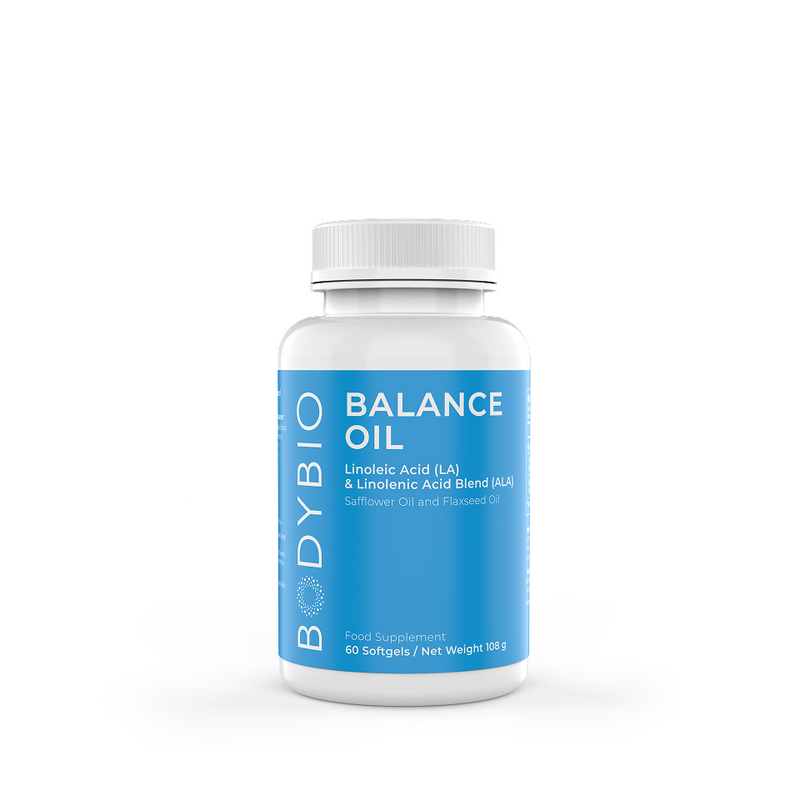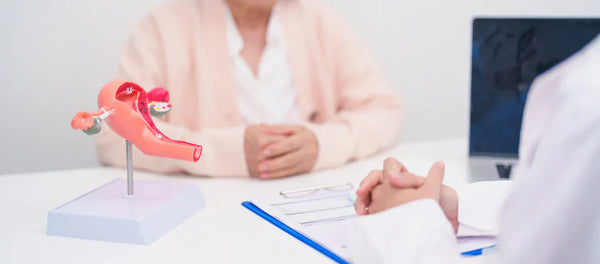5 Multi-Purpose Supplements for Natural Menopause Relief
Although it’s often dismissed as “just another phase of life,” menopause represents the body in complete chaos for many women. Symptoms like hot flashes, weight fluctuations, trouble sleeping, and loss of bone density are common, but perhaps the most troubling symptoms are the ones that tend to be openly discussed the least: mood changes.
We are already living in stressful times — dealing with hormonal anxiety, depression, and mood swings on top of situational stress would be enough to push anyone off the mental and emotional deep end. There’s no shame in needing extra support, nutritionally or socially.
You’ll need to find the second kind within your own community, but we can offer suggestions for the first. There are many natural remedies that offer the prospect of relief and support through this major physiological — and in many cases psychological — transition.
In this article, we’ll review some of the best menopause supplements and nutritional support for women experiencing physical, mood, and cognitive health challenges during this time.
Table of Contents:
- Can Supplements Relieve Menopause Symptoms
- Best Menopause Supplements
- Vitamin C
- Vitamin E
- Essential Fatty Acids
- Phosphatidylcholine
- Adaptogens
- Choosing the Right Menopause Supplement for You
Can Supplements Relieve Menopause Symptoms?
We may sell supplements, but we’ll be the first to say that no supplement is a magic bullet for any single issue. That being said, there are supplements that can support women through menopause and tame the effects of fluctuating hormones.*
In terms of supporting the menopausal woman, we can also think about two related areas of health: brain health (aging) and detoxification. When you look at menopause as needing support in all of these areas — hormones, brain health, and detoxification — you get a much more complete picture of a menopausal woman’s needs.
Conventional treatment for menopause symptoms, i.e. hormone replacement therapy, focuses on just one of these pillars. Consequently, this treatment fails for many women, or even makes their symptoms worse.
Best Menopause Supplements
These are some of our favorite supplements for menopause:
- Vitamin C
- Vitamin E
- Essential Fatty Acids (Evening Primrose Oil, Balance Oil, Fish Oil)
- PC
- Adaptogens, such as ginseng and Ginkgo biloba.
Surprised? This is certainly not an exhaustive list of every possible supplement for menopause. These are just the ones that we see as highly supportive of those three key areas — hormones, brain health, and detoxification. As a consequence, they often also balance mood and relieve mental and emotional stress.*
Let’s take a closer look at these supplements and why you should consider them for menopause symptoms.
Vitamin C
It’s boring, but highly effective. Vitamin C is a major antioxidant, supporting detoxification (including hormonal detoxification), balancing your mood, and regulating oxidative stress. It has been known to have antidepressant and anti-anxiety effects and supports the adrenals during times of stress. (Menopause definitely counts as a time of stress!)
Epidemiological studies have shown higher vitamin C plasma concentrations in women, suggesting that women may need more of it than men, and low concentrations in both sexes have been associated with symptoms of aging, including cognitive decline.
In addition to cognitive health and detox support, a 2021 study showed that sufficient levels of vitamin C were associated with greater bone mineral density in postmenopausal women.
A simple, yet high-quality vitamin C supplement may be an excellent place to start for peri, menopausal, and postmenopausal women looking for extra nutritional support. Vitamin C is something of an all-rounder, and its positive effects may even go far beyond addressing your current symptoms.*
Vitamin E
Vitamin E is an underappreciated fat soluble vitamin that also acts as an antioxidant, fighting inflammatory free radicals in the body. Like vitamin C, levels seem to correlate with bone density in postmenopausal women, and low levels are associated with osteoporosis.
Vitamin E may also be supportive of vaginal health for issues like dryness and pain with sex. Vitamin E supports estrogen stability in the body, so for the body undergoing fluctuations in estrogen production, extra vitamin E may help smooth out those waves. Finally, vitamin E may help support consistent sleep for those who are often waking up in the middle of the night.
Essential Fatty Acids (Omega-6 and Omega-3)
Essential fatty acid sufficiency and balance seem to play a key role in managing menopause symptoms.
Evening primrose oil, a significant source of omega-6 fatty acids (linoleic acid and gamma linolenic acid), was shown to alleviate psychological symptoms in menopausal women at a dose of 1 gram twice daily. In the array of psychological symptoms, researchers included depression, decreased energy, decreased concentration power and academic performance, fatigue, mental fatigue, aggressiveness, irritability, loneliness, sleep disruption, and decreased sexual desire.
EPO was also shown to calm hot flashes and night sweats, reducing frequency and severity at a dose of 1 gram twice per day.
Omega-3 fatty acids also seem to support peri- and postmenopausal women, regulating other fatty acids in the body and lowering the prevalence of depression.
Phosphatidylcholine (PC)
PC is the main phospholipid that makes up our cell membranes, facilitating transport of nutrients and waste in and out of the cell, supporting liver detoxification, and complementing healthy aging. A stellar PC supplement will also be able to provide supplemental choline when needed, a key ingredient in our most abundant neurotransmitter, acetylcholine.
With these mechanisms, PC has been shown to reduce fatigue, improve cognition and recall ability, and balance mood,* all issues common to menopause. Similar to vitamin C, PC may act as a nutritional multi-tool for menopausal women.
Adaptogens
A final class of supplements worth mentioning are adaptogens. Chinese medicine has long used various herbs under this umbrella for addressing hormonal imbalances, fatigue, sexual dysfunction, mood swings, and many other issues common to menopause. Adaptogens are unique in that they promote homeostasis whether your body is in a state of excess or deficiency — they help you adapt to reach a middle ground. Some options backed up by scientific studies include:
- Panax ginseng
- Rhodiola rosea
- Schisandra chinensis
- Ginkgo biloba
- Maca root (Lepidium meyenii).
Adaptogens can be highly individual to each person; what works great for one may have no effect at all for another. It may help to consult a traditional Chinese medicine practitioner who can recommend a combination of herbs for your needs.
Choosing the Right Menopause Supplement for You
If you’re completely new to supplements for menopause, investing in something that may support your health across multiple categories — mood, brain health, hormone balance, and detox — is a good idea. This is why seemingly simple interventions like vitamin C or PC can go a long way toward relieving your symptoms.
Of course, making sure you’re eating an anti-inflammatory diet, moving your body on a daily basis, and taking time to relax and practice self-care activities is an important foundation to build for supplements to have their greatest effect. Consult with a trusted healthcare professional if you need guidance on these foundations and how to implement a new supplement regimen.
Learn more about essential fatty acid balance for optimal health here.
Travica, N., Ried, K., Hudson, I., Sali, A., Scholey, A., & Pipingas, A. (2020). The Contribution of Plasma and Brain Vitamin C on Age and Gender-Related Cognitive Differences: A Mini-Review of the Literature. Frontiers in integrative neuroscience, 14, 47. https://doi.org/10.3389/fnint.2020.00047
Mangano, K. M., Noel, S. E., Dawson-Hughes, B., & Tucker, K. L. (2021). Sufficient Plasma Vitamin C Is Related to Greater Bone Mineral Density among Postmenopausal Women from the Boston Puerto Rican Health Study. The Journal of nutrition, 151(12), 3764–3772. https://doi.org/10.1093/jn/nxab291
Mata-Granados, J. M., Cuenca-Acebedo, R., Luque de Castro, M. D., & Quesada Gómez, J. M. (2013). Lower vitamin E serum levels are associated with osteoporosis in early postmenopausal women: a cross-sectional study. Journal of bone and mineral metabolism, 31(4), 455–460. https://doi.org/10.1007/s00774-013-0432-2
Parnan Emamverdikhan, A., Golmakani, N., Tabassi, S. A., Hassanzadeh, M., Sharifi, N., & Shakeri, M. T. (2016). A survey of the therapeutic effects of Vitamin E suppositories on vaginal atrophy in postmenopausal women. Iranian journal of nursing and midwifery research, 21(5), 475–481. https://doi.org/10.4103/1735-9066.193393
Parazzini F. (2015). Resveratrol, tryptophanum, glycine and vitamin E: a nutraceutical approach to sleep disturbance and irritability in peri- and post-menopause. Minerva ginecologica, 67(1), 1–5.
Safdari, F., Motaghi Dastenaei, B., Kheiri, S., & Karimiankakolaki, Z. (2021). Effect of Evening Primrose Oil on Postmenopausal Psychological Symptoms: A Triple-Blind Randomized Clinical Trial. Journal of menopausal medicine, 27(2), 58–65. https://doi.org/10.6118/jmm.21010
Kazemi, F., Masoumi, S. Z., Shayan, A., & Oshvandi, K. (2021). The Effect of Evening Primrose Oil Capsule on Hot Flashes and Night Sweats in Postmenopausal Women: A Single-Blind Randomized Controlled Trial. Journal of menopausal medicine, 27(1), 8–14. https://doi.org/10.6118/jmm.20033
Chae, M., & Park, K. (2021). Association between dietary omega-3 fatty acid intake and depression in postmenopausal women. Nutrition research and practice, 15(4), 468–478. https://doi.org/10.4162/nrp.2021.15.4.468
Lee, M. S., Shin, B. C., Yang, E. J., Lim, H. J., & Ernst, E. (2011). Maca (Lepidium meyenii) for treatment of menopausal symptoms: A systematic review. Maturitas, 70(3), 227–233. https://doi.org/10.1016/j.maturitas.2011.07.017
Chan S. W. (2012). Panax ginseng, Rhodiola rosea and Schisandra chinensis. International journal of food sciences and nutrition, 63 Suppl 1, 75–81. https://doi.org/10.3109/09637486.2011.627840







